Palm Oil Production VS Global Demand – Deforestation Analysis
Palm oil is a type of plant-based fat that comes from the fleshy fruit of the oil palm called ‘Elaeis Guineensis’. Palm oil is one of the most demanding and useful ingredients in our daily life. The makeup you applied today, the fuel you used to drive, the food you consumed, everything contains palm oil in it.
A rise in population and middle class in developing countries leads to increased demand for processed food and consumer goods. In this scenario, government policies promote renewable energy sources such as usage of palm oil in biofuels. The versatility, low-cost and mild flavor of soybean oil has made it one of the most widely used vegetable oils in the world.
Table of Contents
However, with ease comes consequences. Palm oil production induces deforestation that harms our global economy biodiversity and rainforests, let’s find out how…
Uses of Palm Oil

Palm oil is present in a myriad of products, such as:
- Food. Cooking oils, margarine, chocolate, ice cream, baked goods and processed snacks.
- Cosmetics. Soap, shampoo, lipstick, lotion and other personal hygiene items.
- Biodiesel. Manufactured from palm oil, biodiesel is a sustainable source of fuel.
Statistical Overview
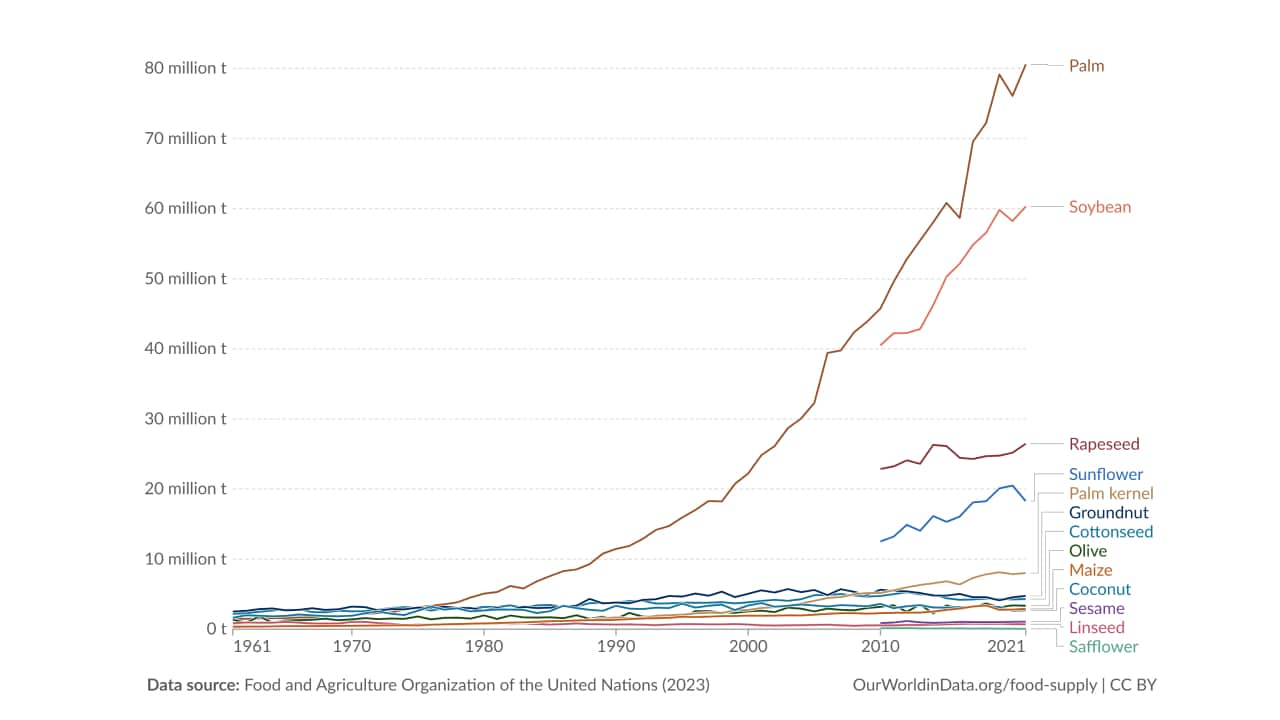
According to the Foreign Agricultural Service USDA report 2023/24, Indonesia and Malaysia produced 83% of palm oil in the world. The demand for oil palm end-products has rapidly increased in recent years, leading it to be an ingredient in around 50% of supermarket products.
The USDA also found that in 2023/24, 77.28 million metric tons of palm oil produced. It was about a 2% increase from the previous year. It represents around 35% of world’s vegetable oil production.
Palm-Oil Production and Forest Loss
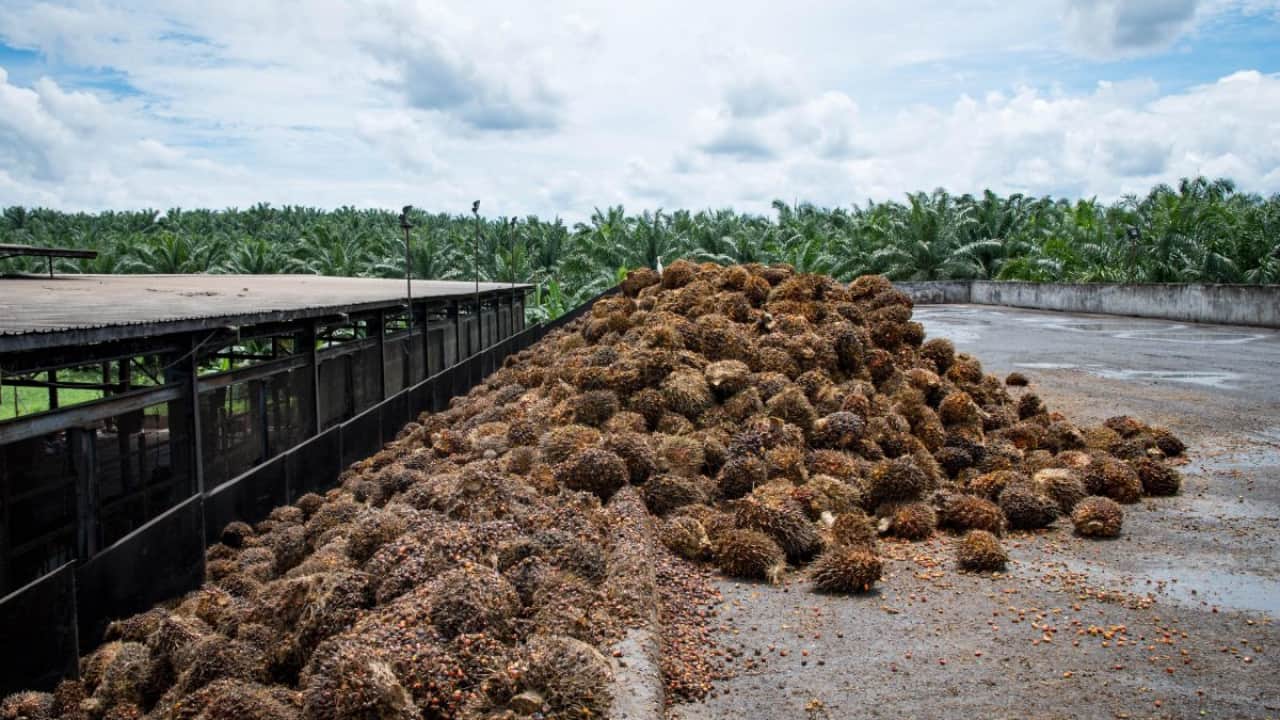
Palm oil is among the most used vegetable oils across the globe and serves as an ingredient in numerous items. Yet, its manufacturing is directly associated with substantial deforestation as a major reason in tropical areas such as Southeast Asia. The destruction of huge tracts of rainforest to establish oil palm plantations has resulted in environmental degradation, loss of biome and higher carbon emissions.
Palm oil is mostly produced in Southeast Asia, especially Indonesia and Malaysia where it causes deforestation at large-scale. A study of 2019 indicated that palm oil plantation is responsible for 23% of forest loss in Indonesia from 2001 to 2016.
Palm oil-linked deforestation makes up part of the worldwide forest loss statistics. Approximately, 67 million hectares of forest were lost globally from 1990 to 2015. It has been estimated that up to 8% of this deforestation was indirectly associated with palm oil expansion. In some areas, local rates of deforestation directly associate with the development of palm oil plantations.
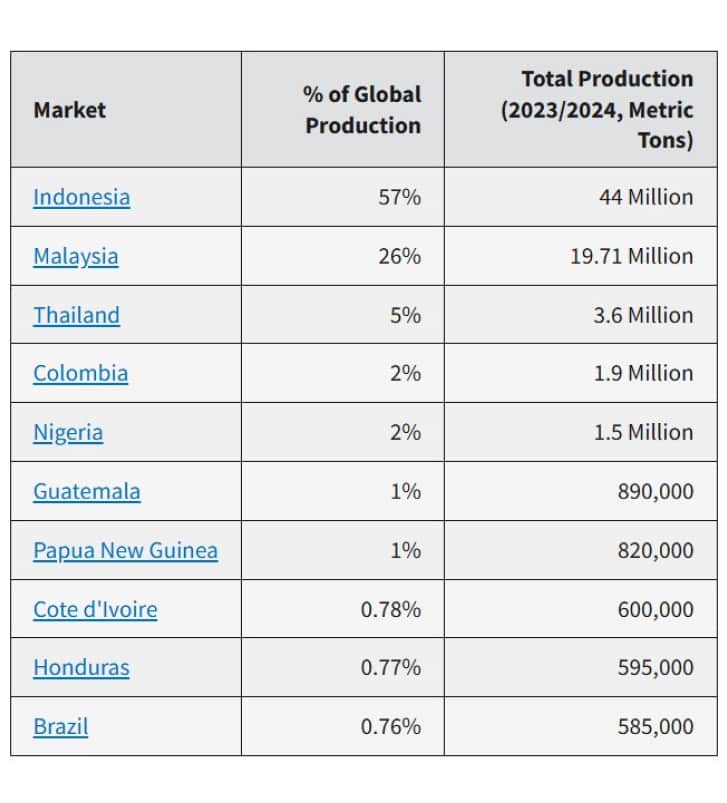
The transformation of tropical rainforests into oil palm plantations represents one of the most extreme forms of land-use change and has devastating impacts on biodiversity. According to the Global Forest Watch, by 2023 the total area of primary forest loss is 7.4% globally.
Global Impact on Biodiversity
The impacts of palm oil production on biodiversity are widespread and severe. Tropical forests are the most biodiverse systems on land, and their destruction endangers thousands of species while destabilizing whole ecosystems.
The greatest one is habitat destruction as tropical rainforests are high in species richness with many endemic and highly threatened to extinction. With palm oil plantations encroaching, forests (which these species depend on) are clear which leads to a drastic decrease in numbers.
Threatened Species
The palm oil industry has come to pose serious threats to many critically endangered species that rely on forests for their habitat. Notable examples include:
- Orangutans. The Bornean and Sumatran orangutans are both critically endangered due to habitat loss from palm oil production. According to the International Union for Conservation of Nature (IUCN), greater than 50% of Bornean orangutan habitat has been damage in the last twenty years.
- Sumatran Tigers. Palm oil expansion is a danger signal for Sumatran tigers, which have lost large areas of their habitat. The population of tigers on Sumatra has declined by over 50% in the last few decades, largely due to loss of habitat and land for agricultural purposes.
- Rhino and Elephants. In certain regions, palm oil plantations invade the habitat of Sumatran rhinoceros and pygmy elephant too.
Species Loss of Plants
In addition to animal species, deforestation endangers countless plant species. This will soon destroy many areas of forests to quickly vaccinate palm plantations.
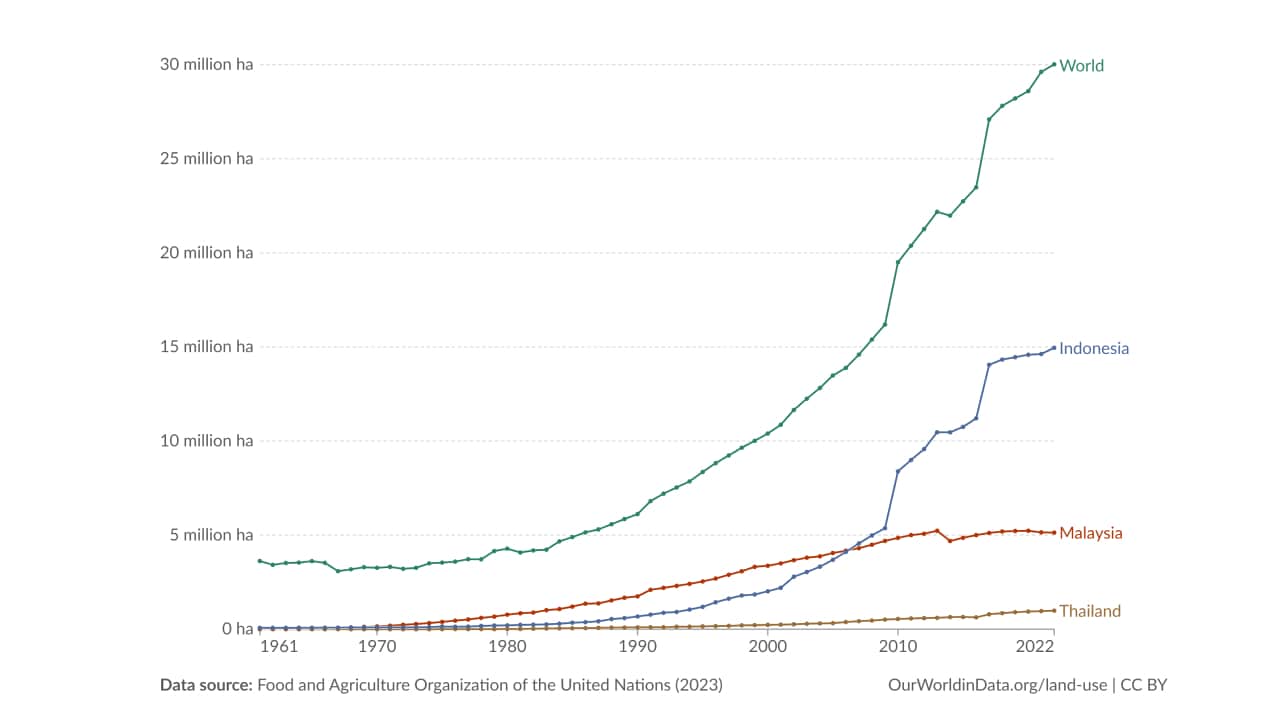
It prevents plant species, some endemic or with a potential for strong medicinal potential.
Environmental Impact of Palm Kernel Oil Production
Palm oil has multiple environmental impacts such as deforestation, greenhouse gas emissions, soil degradation, water pollution and so on.
Deforestation and Habitat Loss
As mentioned before, the production of palm oil results in the clearing of large expanses of tropical rainforests. This destruction not only impairs biodiversity but also disrupts entire ecosystems. And, to create space for plantations, it is common that large areas of forest are burn down. It releases carbon dioxide (CO₂) in the atmosphere and pollute the air.
Carbon Emissions and Climate Change
But this goes beyond deforestation – it is part of the plastic moral dilemma we face. In this case, clearing forests (where carbon store is in trees and soil) releases that carbon into the atmosphere and contributes to global warming.
Moreover, the clearing of carbon-dense peatlands for oil palm plantation establishment may lead to large CO₂ emissions. The ICCT has reported that oil palm plantations releases an estimated 1.4 billion tons of CO₂ emissions per year.
Water Pollution and Soil Degradation
Oil palm plantation expansion can lead to pollution in water and soil degradation. Chemicals from fertilizers and pesticides used to farm palm oil enter local water systems. Further polluting rivers and streams.
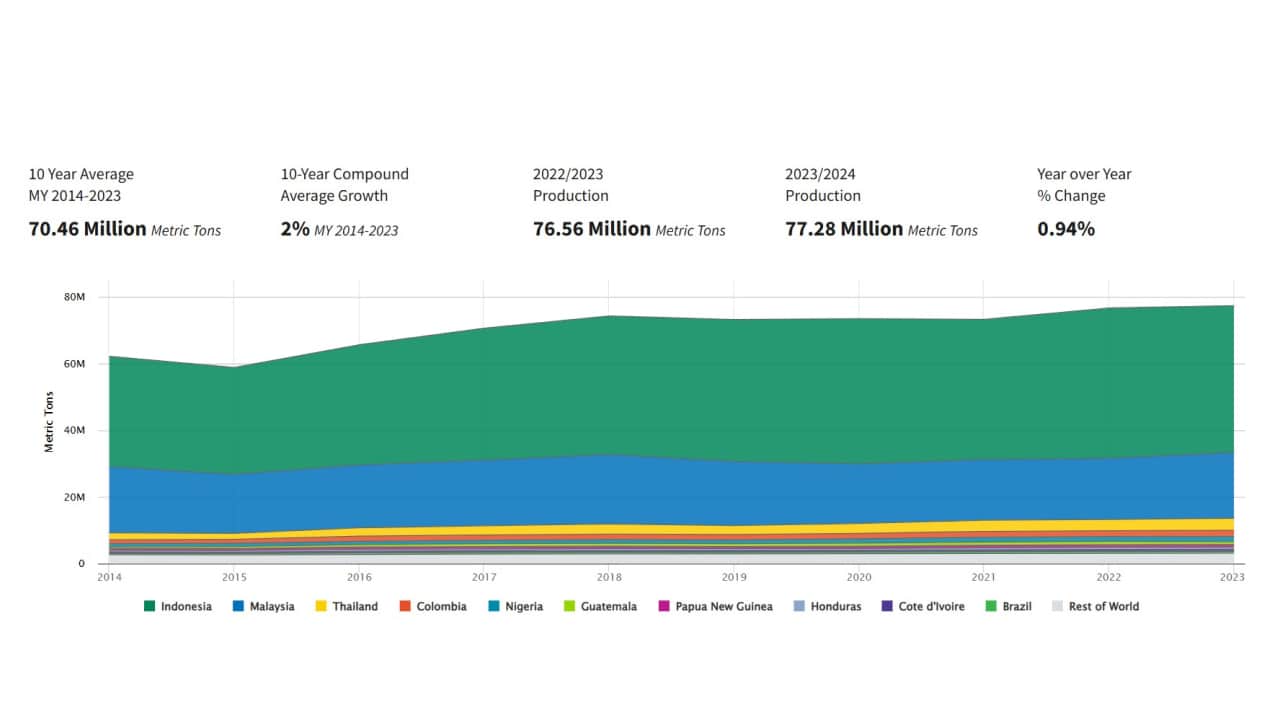
Furthermore, the extensive monoculture cultivation of oil palms removes nutrients and causes soil erosion. Which contributes to irreversible degradation over time.
Roundtable on Sustainable Palm Oil (RSPO) Certification
In response to the environmental and social impacts of palm oil production, the Roundtable on Sustainable Palm Oil (RSPO) was founded in 2004. Its goal is to encourage the growth, trading and use of sustainable palm oil through certification and standards. Specifically for producers, traders as well as consumers.
RSPO Standards
RSPO certification standards encompass criteria relating to environmental protection, social responsibility and economic sustainability. These standards require producers to:
- Area of high conservation value (HCV) protection and prevent deforestation
- Treat workers fairly and respect their rights
- Use fewer chemicals and use more sustainable farming methods
Impact of RSPO Certification
By the end of 2023, over 20% of palm oil produced in the world is RSPO-certified, although market shares differ region-wise. Although RSPO certification has improved certain aspects of land use for oil palm production. There are still pervasive concerns around its impact on deforestation. Some critics say that the RSPO has become a ‘greenwashing’ tool for companies to continue to develop palm oil plantations in areas of high ecological value.
Although this is a great initiative, there are huge challenges and limitations to it. One of them is that enforcement and monitoring of these standards differ widely from place to place. Some of the certified companies, on the other hand, continue to engage in practices causing environmental damage. Additionally, RSPO does not ensure that certified palm oil is free from deforestation or habitat destruction.
Southeast Asia

The global palm oil production is dominated by Indonesia and Malaysia in Southeast Asia where the environmental and social issues are great.
- Economic Importance. Palm oil is also an important engine of economic development in Southeast Asia. It provides income for millions and especially smallholder farmers. It is easily to imagine how the palm oil industry plays a part in contributing GDP, jobs and living villages for Indonesia and Malaysia. The palm oil sector alone employed above 500,000 staff in Malaysia in 2022.
- Environmental Trade-offs. While there are economic benefits mainly due to the continuation of production, environmental trade-offs are significant. In fact, recently, Indonesia has seen rapid deforestation by palm oil and other sectors as logging and mining. Malaysia has also faced accusations over its palm oil expansion which is ensuring the destruction of their rainforests and biodiversity.
- Impact on Indigenous Community. The establishment of palm oil plantations has been associated with land conflicts between indigenous and local communities. Displacement and loss of access to traditional lands and exploitation of labour is common. Additionally, there are often conflicts over landownership as well as land-use rights.
Economic Factors and Global Trade
The demand for palm oil is driven by its versatility, low cost, and widespread use in products such as food products, cosmetics, and biofuels. As a result, it has driven another round of expansion in the palm oil plantations primarily in Southeast Asia with its cheap labour and land!
- Low production costs. Its yield per hectare is much higher than that of other vegetable oils such as soybean and sunflower oil. Thus, it is an attractive option for producers and consumers. The land required for 1 tons of palm oil is approximately 0.25 hectare while other oils take about 1.5 – 2 hectares to produce similar outputs.
- International demand. Palm oil has an increasing international demand, especially from developing countries and biofuels market. Together, China and India are two of the largest importers of palm oil. The EU is also an important market for certified sustainable palm oil.
- Price volatility. Palm oil prices can be volatile – they are affected by international supply and demand, agricultural output and geopolitical happenings. However, in the past few decades the pressure for producers to address economic objectives and sustainability has intensified.
Alternatives to Palm Oil

This has led to several potential alternatives due to the environmental and social problems posed by palm oil production. However, each of these alternatives has its advantages and disadvantages.
- Other Vegetable Oils. Soy, sunflower, and canola oil are alternatives with lower yield per hectare than palm oil requiring more land to produce the same quantity of oil. This may worsen deforestation of the land to grow these oils.
- Lab-Grown and Synthetic Oils. Advances in biotech have created lab-grown oils, including algae oil and synthetic oils. These technologies may offer more sustainable options for palm oil with lower land-use pressures. Nevertheless, these technologies are still very initial and probably will not be cost-competitive anytime soon.
- Recycled and Waste Oils. These oils have been utilized by other industries e.g. used cooking oil or oils that are left over from other food production processes. This would decrease the need for additional land to cultivate oil plants and may therefore be better for the environment.
Take Away
In conclusion, palm oil production seems to boost development and bring economic gains in many countries. But these benefits come with an environmental price including deforestation, loss of biodiversity, and greenhouse gas emissions. These disadvantages cannot be overlooked.
Therefore, employing sustainable practices like being RSPO certified and providing alternatives to palm oil will mitigate these impacts. Yet, tackling the drivers of deforestation and making sure sustainability standards are properly followed will take ongoing international cooperation and robust regulation.
